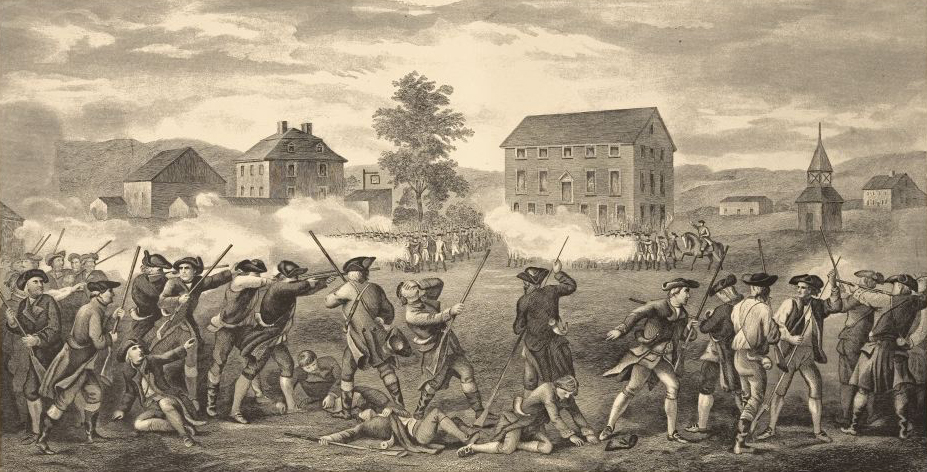Ebenezer Lock at Lexington
Ebenezer Lock (1732-1816) was at Lexington on the morning of 19 Apr 1775. He’s often listed among the militiamen on the town common that day, but with an asterisk, because he wasn’t really.
Lock lived in Woburn and was enrolled in that town’s militia company. He had many ties to Lexington, including worshipping at its meetinghouse, so he must have lived nearby and was interested in what happened there.
In 1824 Amos Lock, Ebenezer’s first cousin and Woburn neighbor, testified about how the two of them experienced the outbreak of war. Amos said that he heard an alarm bell between 2:00 and 3:00 A.M., and knew John Hancock and Samuel Adams were staying in Lexington.
Lock fired the first shot that he and his cousin saw, but that clearly came after the initial “firing.” There were probably a few militia muskets mixed in with the regulars’ guns in those seconds, not even to mention the question of where the very first shot came from.
In April 1859, the Historical Magazine ran a more dramatic account of Ebenezer Lock’s activity on 19 Apr 1775, unsourced but probably based on family or New Hampshire local tradition:
Lock lived in Woburn and was enrolled in that town’s militia company. He had many ties to Lexington, including worshipping at its meetinghouse, so he must have lived nearby and was interested in what happened there.
In 1824 Amos Lock, Ebenezer’s first cousin and Woburn neighbor, testified about how the two of them experienced the outbreak of war. Amos said that he heard an alarm bell between 2:00 and 3:00 A.M., and knew John Hancock and Samuel Adams were staying in Lexington.
Therefore Ebenezer Lock and myself, both being armed, repaired, with all possible speed, to the [Lexington] meetingthouse. On our arrival, we found the militia were collecting; but, shortly after, some person came up the road with a report, that there were not any regulars between Boston and Lexington.Ebenezer Lock moved to Wendell, New Hampshire, by 1790. His body was interred in East Deering, and Lexington historian Bill Poole reports that locals honored his grave even more than other veterans because of his role at Lexington. Supposedly he was the first provincial to fire a shot in the war!
Consequently we concluded to return to our families. We had not proceeded far, before we heard a firing; upon which we immediately returned, coming up towards the easterly side of the common, where, under the cover of a Wall, about twenty rods distant from the common, where the British then were, we found Asahel Porter, of Woburn, shot through the body; upon which Ebenezer Lock took aim, and discharged his gun at the Britons, who were then but about twenty rods from us.
We then fell back a short distance, and the enemy, soon after, commenced their march for Concord.
Lock fired the first shot that he and his cousin saw, but that clearly came after the initial “firing.” There were probably a few militia muskets mixed in with the regulars’ guns in those seconds, not even to mention the question of where the very first shot came from.
In April 1859, the Historical Magazine ran a more dramatic account of Ebenezer Lock’s activity on 19 Apr 1775, unsourced but probably based on family or New Hampshire local tradition:
The first American who discharged his gun on the day of the battle of Lexington was Ebenezer Lock, who died at Deering, N.H., about fifty years ago. He resided at Lexington in 1775. The British regulars, at the order of Major [John] Pitcairn, having fired at a few “rebels” on the green in front of the meeting-house, killing some and wounding others, it was a signal for war. “The citizens,” writes one, might be seen coming from all directions, in the roads, over fields, and through the woods—each with his rifle in his hand, his powderhorn hung to his side, and his pockets provided with bullets.Needless to say, that’s not what Ebenezer Lock’s cousin had testified to thirty-five years before. Bill Poole suggests there may be some basis for this story in Lock’s activity later in the day, after the Woburn companies had mustered and helped to counterattack the British column as it returned east. Even so, the tale has clearly undergone some improvements for later audiences.
Among the number was Ebenezer Lock. The British had posted a reserve of infantry a mile in the direction of Boston. This was in the neighborhood of Mr. Lock, who, instead of hastening to join the party at the green, placed himself in an open cellar, at a convenient distance for doing execution.
A portion of the reserve was standing on a bridge, and Mr. Lock commenced firing at them. There was no other American in sight. He worked valiantly for some minutes, bringing down one of the enemy at nearly every shot. Up to this time not a shot had been fired elsewhere by the rebels.
The British, greatly disturbed at losing so many men by the random firing of an unseen enemy, were not long in discovering the man in the cellar, and discharged a volley of balls, which lodged on the walls opposite. Mr. Lock within, remaining unhurt, continued to load and fire with the precision of a finished marksman. He was driven to such close quarters, however, by the British on the right and left, that he was compelled to retreat.
He had just one bullet left, and there was now but one way to escape, and that was through an orchard, and not one moment was to be lost; he levelled his gun at the man near by, and shot him through the heart. The bullets whistled about him. Lock reached the brink of a hill, dropped his gun, and throwing himself upon the ground, tumbled downwards, rolling as if mortally wounded. In this way he escaped unhurt.


No comments:
Post a Comment